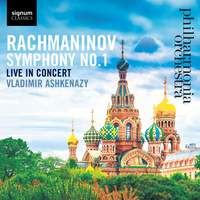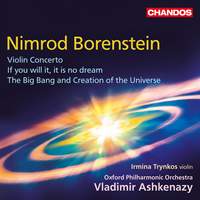Interview,
Vladimir Ashkenazy on Rachmaninov and the Philharmonia
 The great Russian pianist and conductor Vladimir Ashkenazy celebrated his eightieth birthday last month, but shows no signs of slowing down in either of his parallel careers: his recent recording of the Bach French Suites on Deutsche Grammophon won praise from The Observer and BBC Music Magazine, and over the past few months he’s also been hard at work on a recording of orchestral works by Nimrod Borenstein, a British-French-Israeli composer whose work he has championed for years. This Friday sees the release of the first instalment of a new series of live recordings of Rachmaninov’s symphonies with the Philharmonia Orchestra (of which he has been Conductor Laureate since 2000); The Times described the live performance in November as 'a top-notch, utterly gripping account', whilst BachTrack pronounced it 'a barnstorming rendition which gripped from first note until last'.
The great Russian pianist and conductor Vladimir Ashkenazy celebrated his eightieth birthday last month, but shows no signs of slowing down in either of his parallel careers: his recent recording of the Bach French Suites on Deutsche Grammophon won praise from The Observer and BBC Music Magazine, and over the past few months he’s also been hard at work on a recording of orchestral works by Nimrod Borenstein, a British-French-Israeli composer whose work he has championed for years. This Friday sees the release of the first instalment of a new series of live recordings of Rachmaninov’s symphonies with the Philharmonia Orchestra (of which he has been Conductor Laureate since 2000); The Times described the live performance in November as 'a top-notch, utterly gripping account', whilst BachTrack pronounced it 'a barnstorming rendition which gripped from first note until last'.
I spoke to Mr Ashkenazy last month about his long-term relationships with both Rachmaninov’s music and the Philharmonia Orchestra…
Do you think Rachmaninov's reputation in the West has altered much since the 80s when you first recorded the Symphonies?
It’s difficult for me to give a very comprehensive overall view of a composer’s status: musicologists are better qualified than I to assess how and why reputations increase and diminish. But what I can tell you is that I myself am very fond of Rachmaninov – he speaks to me very clearly and his unparalleled generous expression is very essential and insightful to me. I think he was not only extraordinarily professional but also extremely serious, eloquent and substantial and many of his orchestra compositions are on the highest spiritual level. But the spirituality of his expression for which I have a particular affection can be somewhat foreign to others (I am told in Germany especially) which can easily affect the attitude to evaluating his gift. Nonetheless I believe there is this particular authenticity and luminosity which brings many music lovers and critics to a closer identification and better understanding of his message.
I find it very hard to talk about music in general, and to talk about the spirit of the music is often misleading or terribly personal - but I can only tell you that to me as a Russian a lot of his music communicates something very essential of what I understand about our existence, and I’m not talking about only Russian existence but general human destiny.
Does your long experience with the piano repertoire feed into your view of the orchestral music?
First of all, I will never forget the very first symphonic concert experiences of my early childhood at the time when I started playing the piano and how deeply impressed and overwhelmed I was about what the symphonic orchestra had to offer! At that time I attended hundreds and hundreds of concerts and learned a vast amount of orchestral repertoire. My understanding of what the potential of the orchestra and the significance of orchestral repertoire as opposed to of what I can do with the piano repertoire was always very clear to me. Of course the basic attitude to the musical expression is the same, but I’ve never been one to compare, say, Beethoven’s symphonies with his piano sonatas. When you compose for a symphony orchestra, you need to know about instrumental capabilities and orchestral balance – and in those respects Rachmaninov really did have a wonderful feeling for writing for orchestra.
This new recording was made live in concert – do you have a personal preference for live versus studio recordings?
You can never be absolutely sure about anything, even about a studio recording! If a performance goes well, though, there is very often maybe more spontaneity, and some unexpected very positive things. Certainly live performances, in front of an audience, can sometimes generate something very special. But to me there is no general formula for what is more valuable: it all depends on how it goes on the night! Sometimes, though, that spontaneity, that sense of getting it right just now in front of an audience, surpasses some studio recordings.
How has your relationship with the Philharmonia developed over the years?
We started working together a long, long time ago, but when the relationship started I wasn’t really a conductor yet: in fact I’d conducted very little. I remember they invited me for some prestigious recording at a time when I’d really only just begun to conduct great orchestras; after the first rehearsal I went to them and said ‘I know that I’m not yet very professional, and I’m sorry if you can’t always follow me’. And they said ‘You know what? We like what you’re doing so much! Please come again! As for conducting, moving your arms – that you can learn! But what you’ve giving us here – that you can’t learn. That you have already!’. I was very impressed and touched by their attitude, so I’ve conducted them ever since, always accepted their invitations. I’ve always been so very grateful for their support of my music-making.
Vladimir Ashkenazy's live recording of Rachmaninov I with the Philharmonia was released on Signum on 1st September.
Available Formats: CD, MP3, FLAC, Hi-Res FLAC
Recent recordings from Vladimir Ashkenazy
'Ashkenazy aims above all at clarity, and the playing is very fluent, with especially rapid-fire Courantes and noble Sarabandes, the dances always clipped and precise' (The Observer).
Available Formats: MP3, FLAC, Hi-Res FLAC
Irmina Trynkos (violin), Oxford Philharmonic Orchestra, Vladimir Ashkenazy
Available Formats: SACD, MP3, FLAC, Hi-Res FLAC





